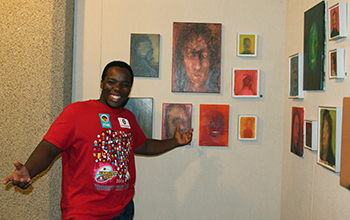Latest News Archive
Please select Category, Year, and then Month to display items
25 March 2024
|
Story Anthony Mthembu
|
Photo Lutendo Mabata
 Prof Nompumelelo Zondi, the newly appointed Vice-Dean: Research and Postgraduate Studies in the Faculty of The Humanities at the University of the Free State (UFS).
Prof Nompumelelo Zondi, the newly appointed Vice-Dean: Research and Postgraduate Studies in the Faculty of The Humanities at the University of the Free State (UFS).
Prof Nompumelelo Zondi has been appointed as Vice-Dean: Research and Postgraduate Studies in the Faculty of The Humanities at the University of the Free State (UFS). Prof Zondi assumed this new role on 1 March 2024 after serving as the Head of Department for African Languages at the University of Pretoria for seven years. “I consider this appointment as an opportunity of growth and learning more about higher education and the Faculty of The Humanities at large,” she said.
Prof Zondi indicates that part of her role is to spearhead the UFS Vision130 within the Faculty of The Humanities, and to ensure that the faculty assists the institution in becoming research-led, student-centred, and globally impactful.
Motivation for assuming this role
One of the primary reasons that led her to consider this role is sharing the knowledge she acquired as part of the Fulbright South African Research Scholar Programme. As a result of that experience and exposure, which went beyond the Ohio State University, she felt it befitting to implement some of the insights she acquired on a bigger scale. Therefore, even though she was impactful in her previous role, Prof Zondi believes that this is an exceptional and more desirable platform to do so. “I feel that I will have easier access to departments within the faculty, while also encouraging and supporting interdepartmental and faculty collaborations,” she explained.
A significant component of Vision 130
He believes that the elements that make up Vision 130 are interrelated. While she considers research central to Vision 130 – as she begins her journey at the UFS, she feels students deserve to be nurtured to further contribute to the university’s impactful research. Thus, student-centredness is the way to go. “I believe that students must be major role players in this Vision130; we must include them in the interactions and discussions that are part of the university’s strategic plan as well as in decision-making processes,” she said. As such, according to Prof Zondi, the more the faculty and the institution care for the students and involve them in Vision130 and in collaborations, the more research outputs the university will achieve.
Pauline Gutter’s metaphorical representations of South Africa
2016-04-07

Art student, Thamsanqa Malgas views the Purgatorium exhibition at the Stegmann Gallery on the Bloemfontein Campus (UFS).
Photo: Rethabile Isaacs
|
Purgatory is a temporary condition of torment or suffering. This is the central thread of the renowned artist’s exhibition, Purgatorium, at the University of the Free State (UFS). Pauline Gutter’s exhibition was opened by Harry Siertsema on 9 March 2016 at the Stegmann Gallery on the Bloemfontein Campus.
The artist, who grew up on a farm in the Free State, is influenced by animals and farm life. “My work is on many levels a metaphorical representation of the violence of current South Africa. Some people want to move away from stigma, others adopt hysteria. The impressive yet vulnerable bulk of the bulls depicted in uncomfortable positions manifests the voiceless and powerless generation of food producers in their daily struggles for survival,” she wrote in the catalogue of the exhibition.
Prof Dirk van den Berg of the UFS Department of History of Art and Image Studies wrote an essay about the exhibition, in which he captures the lived endurance of stress and suffering which Pauline Gutter depicts vividly in Purgatorium.
“The paintings, drawings, and prints in this exhibition have, in various ways, the effect of disseminating the basic tenor of the weaning metaphor of struggle for survival into the farming domains of the land, its creatures, and its people,” said Prof van den Berg.
Art student, Thamsanqa Malgas, was very impressed with the exhibition, saying that it was a fascinating collection, and a must-see for art lovers. The exhibition closed on 1 April 2016.